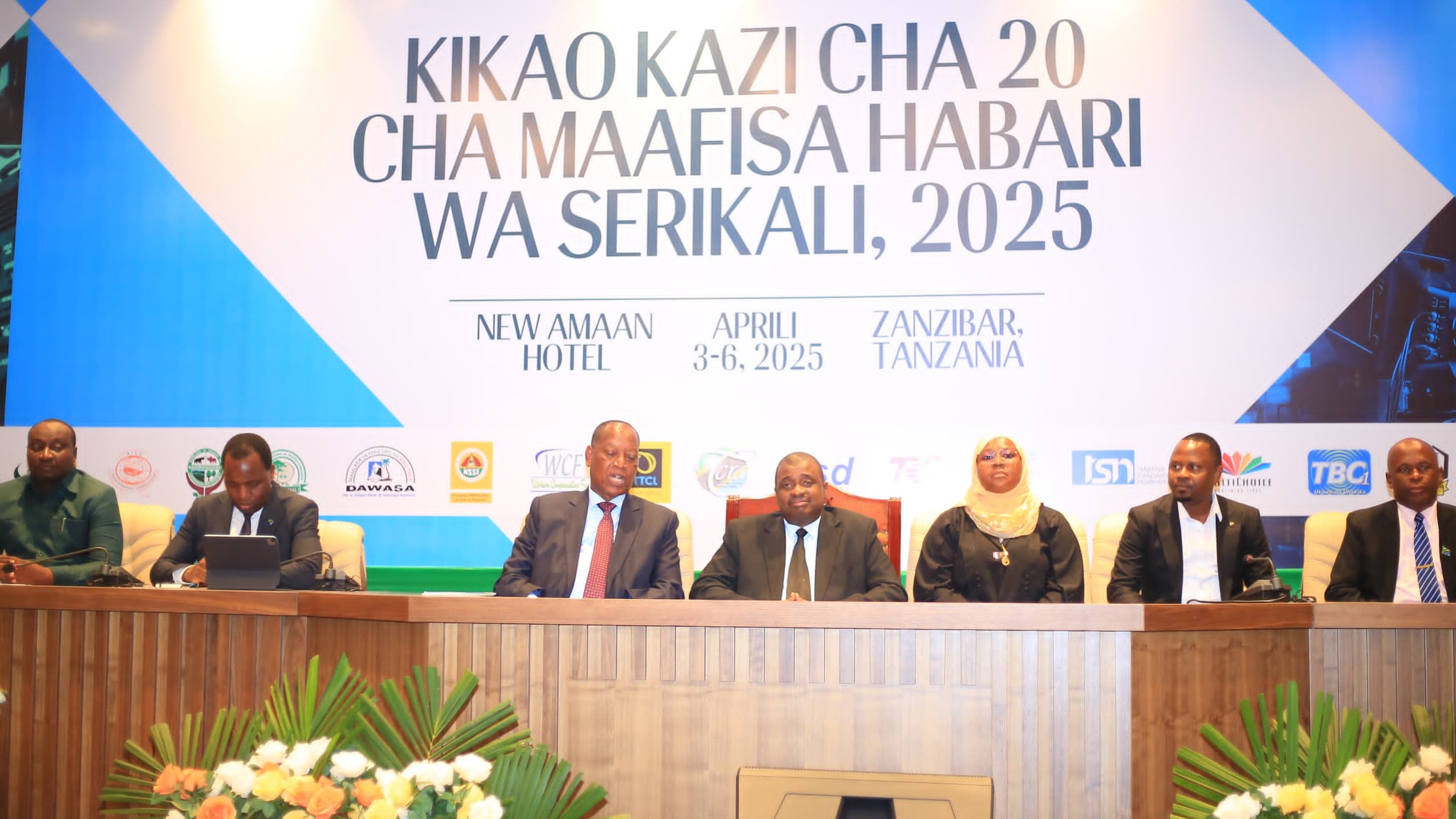Government communication officers discuss strategic development projects

By William Gatambi
Zanzibar, April 3, 2025 – The annual meeting for Government Communication Officers commenced today in Zanzibar with a high-profile opening ceremony, attended by notable government leaders from both Zanzibar and the Tanzania Mainland. The event, running until April 6, 2025, is a platform to address critical communication strategies in government and the upcoming general election in October 2025.
The Guest of Honour at the opening ceremony, His Excellency Hemed Suleiman Abdulla, the Second Vice President of the Zanzibar Revolutionary Government, delivered a powerful address, outlining seven key directives for all government institutions. These directives aim to enhance government communication efforts and ensure greater transparency and public engagement in national development projects.
The first directive emphasized the need for each government institution to develop comprehensive communication strategies. "We cannot afford to leave communication to chance. Every government institution must have a well-planned communication strategy aligned with our development goals," Abdulla stated. This approach aims to streamline messaging and ensure that the public is informed about government actions and policies.
Further reinforcing this vision, the Second Vice President directed that every government institution should employ communication officers who are well-versed in the complexities of modern communication. "Our communication officers must be equipped to manage media relations and handle public discourse effectively," Abdulla noted, highlighting the importance of skilled professionals in public communication.
The Second Vice President also emphasized the importance of budgeting for communication and public relations. "A specific budget for communication should be allocated in every government institution’s financial plan. Communication should be a priority in our development agendas," Abdulla remarked. This directive aims to ensure that communication is not treated as a supplementary function but as an integral part of governmental operations.
In recognition of the evolving media landscape, Abdulla stressed the necessity of continuous training programs for communication officers. "Our officers must be kept up-to-date with the latest media trends and technologies. Training is key to enhancing the effectiveness of government communication," he explained.
Abdulla also underlined the pivotal role of communication officers in government strategic development projects. He pointed to the Bus Rapid Transit (BRT) project in Dar es Salaam as a prime example of a national initiative requiring coordinated communication efforts. "Communication officers must be actively involved in all strategic development projects to ensure that the public understands the significance of these projects," Abdulla said.
Another major directive focused on the relationship between the government and the media. The Second Vice President called for fostering positive relationships with media houses, which are essential for accurate and timely dissemination of information. "We must build stronger ties with the media to ensure that our messages reach the public effectively and efficiently," he emphasized.
Hon. Prof. Palamagamba Kabudi, the Minister of Information, Culture, Arts, and Sports of Tanzania Mainland, also delivered an address, echoing the importance of strategic communication in national development. Kabudi remarked, "The success of government projects, including the BRT, depends on how well we communicate their benefits to the public. We must be transparent and proactive in our communication efforts."
The Minister of Information, Culture, Arts, and Sports of Zanzibar followed with a speech highlighting the shared responsibility of both Zanzibar and Tanzania Mainland in promoting effective communication. She underscored the need for unity and collaboration between the two governments to ensure that communication strategies are aligned for the benefit of all Tanzanians.
Gerson Msigwa, the Permanent Secretary in the Ministry of Information, Culture, Arts, and Sports of Tanzania Mainland, also participated in the discussions, emphasizing the need for communication structures that foster national unity. "Good communication will enable us to work together as one nation towards our common goals. It is time for us to prioritize this in all our institutions," Msigwa said.
The discussions then turned to the general election in October 2025. Abdulla urged the communication officers and journalists present at the meeting to use their platforms to educate the public about the importance of voting for political leaders who are competent and have the country’s best interests at heart. "The upcoming election is critical for our nation's future. We must ensure that the public is well-informed about the merit-based selection of leaders," he stressed.
The Vice President’s remarks were followed by a call for journalists and communication officers to work together in providing a platform for open discussion about the election. "Journalists and communication officers must use the media to create a space for healthy debate and dialogue about the qualities voters should seek in political leaders," Abdulla explained.
Msigwa added, "The media is an essential partner in shaping public perception during the election cycle. We must ensure that voters understand the importance of voting for leaders who are not only qualified but also committed to the nation’s development."
The BRT project was again mentioned as an example of how effective communication is vital in large-scale national initiatives. The project, which aims to transform transportation in Dar es Salaam, was noted as a key initiative that requires clear communication strategies to ensure public support and participation.
The meeting concluded with a collective agreement to take concrete steps toward implementing the directives set forth by the Second Vice President. Communication officers and journalists expressed their commitment to supporting the government’s communication efforts, particularly in the lead-up to the 2025 general election.
As the meeting progresses through April 6, 2025, it is expected that concrete plans and strategies will be developed to improve government communication and foster a more informed and engaged electorate in the upcoming general election.

